What should new swimmers know about practice?
You’ve joined a swim team and now find yourself facing down your first practice. Yet you have no idea what that will entail. Or, what to expect at your first swim practice. So what should new swimmers know about swim practice?
Related article: What to Know About Swim Practice & Dryland
Disclosure: This post may contain affiliate links, meaning we earn a small commission at no cost to you if you purchase something through one of our links. As an Amazon Associate, we earn from qualifying purchases. Please check out our disclosure page for more information.
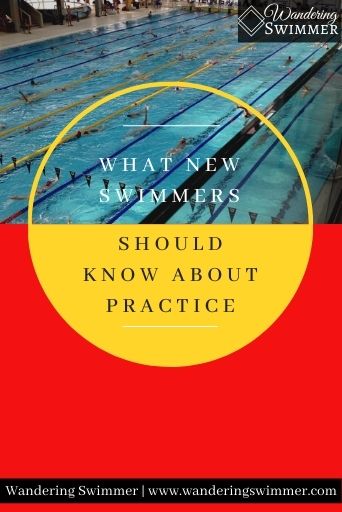
Nutrition
Before practice even begins, you should eat something.
When you have a 2-3 hour practice, your body needs fuel to keep going. If you skip out on eating prior to practice, chances are, you won’t have a good practice. You’ll feel lethargic and everything will feel that much harder.
What exactly you should eat, though, will vary by swimmer.
For some, something with carbs and protein works best. However, another swimmer could favor a different meal.
It’s also important to know how certain foods interact with your body. Some foods can upset your stomach easier than others. Others can give you heartburn. Or you’ll find that some food can give you bad gas. None are pleasant to deal with during swim practice!
Related article: What Should I Eat Before Morning Practice?
Because of this, you have to watch what you eat throughout the day. Know what certain foods do what to you and adjust accordingly.
Additionally, how much you should eat also varies by swimmer. Some swimmers can eat more before a practice and not feel sick. Others, not so much 🙂
You’ll discover what works best for you through trial and error.
Arrive Early
One thing swimmers should know about practice is to arrive early.
Why?
This gives you plenty of time to stretch out your muscles before swim practice begins. A good stretch will wake up your muscles and help prevent injury. Most, if not all, coaches will have you stretch prior to getting into the water.
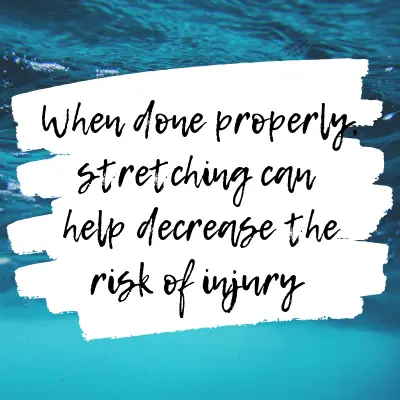
Your coach could have you stretch either individually or as a team. Sometimes, you’ll do both!
We should note that stretching typically occurs before the actual practice time. The practice time itself doesn’t start with stretching.
For example: If practice starts at 5:00, you’re expected to be changed and ready to start practice at 5:00. Not start stretching at 5:00 and getting in the water 20 minutes later.
Related article: 6 Things to do Before Swim Practice
Stretching is an important part of swimming. When done properly, stretching can help decrease the risk of injury. It’s not something you want to rush.
This is especially true for morning workouts, as your muscles are still ‘cold’. In that, you’ve just rolled out of bed and haven’t moved around very much. You’ll want to ensure that you warm up your muscles to prevent injury.
However, it does take a while before you can develop a stretching regimen that works best for you. So be sure to give yourself some time and remain patient 🙂
Practice Time
In general, you can expect practices to last from 1-3 hours based upon the team. Some days will vary in length. And most days will vary in what the team does.
You can also expect some days to have a mix of water and dryland workouts. For most teams, certain days are dedicated to both water and dryland workouts. While others are strictly water workouts.
Related Articles:
- How to do Dryland Workouts at Home
- Best Dryland Equipment for Swimmers at Home
- Dryland Workouts Without Weights at Home
Typically, most teams will post or publish a monthly schedule. Be sure to review this as it’ll list the days and times of each practice.
These times flex the most during school holidays, such as winter and summer vacation.
When in doubt, check your schedule to see what time practice is and how long it will run. This ensures that you’re not showing up late or left stranded at the pool when practice times and duration change.
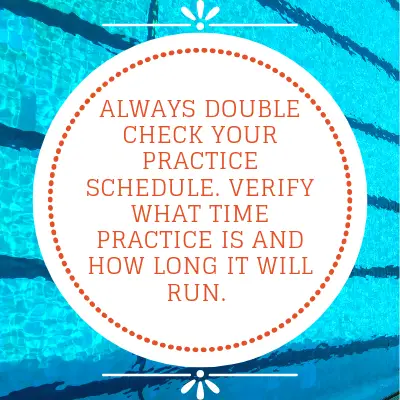
Practice structure
Each coach is unique in their approach to running swim practice.
At best though, you can expect to start practice with a warm-up. Much like stretching, warm-up helps loosen up the muscles. It also eases the body into the main part of practice.
And much like stretching, it’s important that you don’t arrive late. Otherwise, you miss out on this important part of practice, which could lead to injury.
Following the warm up, you can typically expect a main set.
Main sets truly vary by coaches. Some will have one long set that repeats several times through and take the whole length of practice.
Related article: Swimming Secrets: What Really Happens at Swim Practice
Others might do a smaller, more difficult main set. Which is then followed by some kicking, drill work, and then another smaller, difficult set.
Lastly, some coaches have set strokes/distances for each day. For example, Monday’s might always be distance day, while Wednesday’s focus on IM or specialty stroke. And then you have some coaches who don’t follow any set pattern!
For this reason, it’s best to go into your practices with an open mind.
Finally, near the end of practice, you can expect to have a cool down. Cooling down helps flush out the lactic acid in your muscles. This in turn helps to prevent cramps and sore muscles.
It is possible, however, that you might not have a cool down. Especially in the middle of the training season. Some coaches will do this on purpose as part of the training program.
Hydration
Staying hydrated is especially important while training. In theory, swimmers should know to stay hydrated at practice, but it’s easily overlooked.
Yes, you’re surrounded by water, but that doesn’t mean that you’re not sweating. Especially if you’re swimming outdoors in hot weather.
Keep a bottle of water or some sort of sports drink at the end of your lane. And don’t just keep it there to look pretty. Make sure you actually drink it! 🙂
Staying hydrated during practice helps prevent cramps, headaches, and sore muscles. Plus, it keeps your body fueled so it can continue to work.
Related article: What Should You Bring for your First Swim Practice?
If you have a hard time drinking during practice, then start out small. Take small sips between sets and gradually work up to larger amounts.
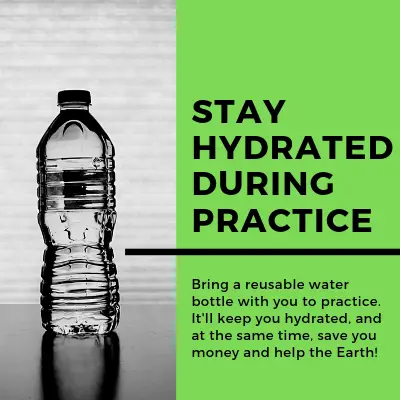
After practice snack
You made it through practice, congrats! But there’s one more thing to cover before you’re truly done.
Following your practice, you should ensure that you’ve packed a snack to eat. This helps your muscles recover quicker and helps build up their strength.
Most swimmers will have a protein bar of some sort after practice. One that is high in protein but low in sugar. They might also have a recovery drink either directly after practice or when they get home.
Ideally, you should eat your snack within ten minutes or so of finishing practice. Your body has a small window to take in these recovery nutrients that will help your muscles recover.
When you wait until you get home to eat something, you’ve already missed that window for recovery. By taking a small snack to eat before your main meal, you can help your body recover that much faster.
Related article: What Should You Do After Swim Practice?
If you skip your post workout meal altogether, you run the risk of dealing with fatigue later in the day. This is especially important if you have another practice in the afternoon.
What you do or don’t do in the morning sets your afternoon sessions up for success or failure.
In Closing
Swim practices aren’t just a few hours and you’re done. At least not if you want to be successful.
A large majority of swimmers simply show up to practice, swim and then leave. Without stretching or worrying about proper nutrition.
As my coaches used to say, those swimmers are just existing.
Successful swimmers though know that swim practices are an all day thing. They require dedication both at the pool and away from it. In terms of proper nutrition and hydration throughout the day.
These swimmers will go further and faster than those that just show up.
So the real question is: which swimmer are you and which one do you want to be?
As always, to happy swimming!
-Chevron
Bonus Content:
30 Words to Get You By at Swim Practice: Swim teams have dozens of words unique to swim practice alone. If you’re joining a swim team you know some of the various terminology used at practice.
Swim Practice While Traveling: Missing swim practice due to traveling for work, school, or family is to be expected at some point in time. The good news is that training while traveling is possible.
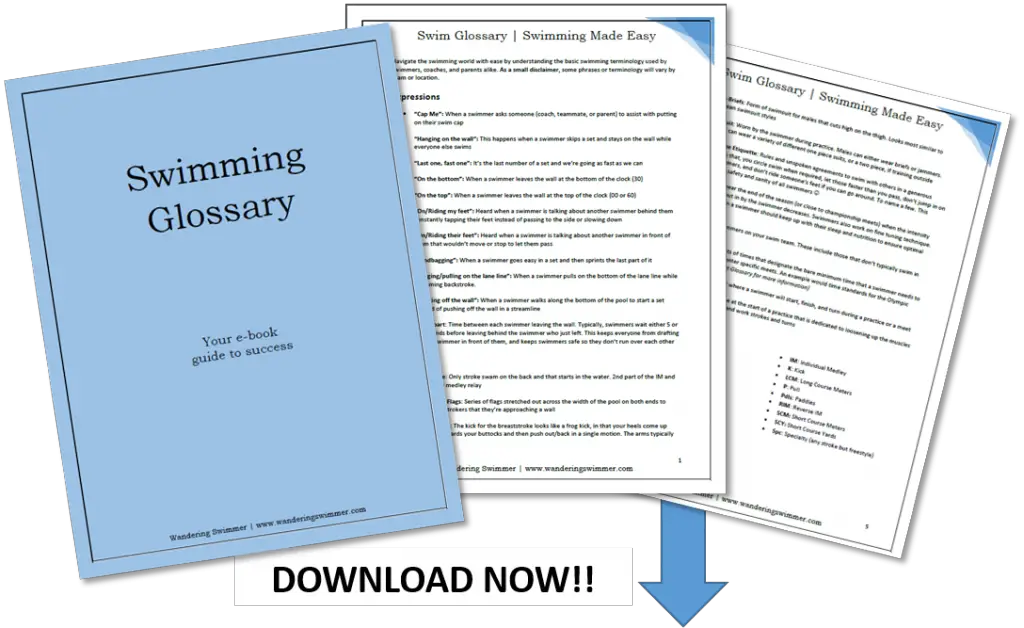
Want to Improve at the Pool?
Join swimmers and swim parents to receive my free newsletter and receive a free Swimming Glossary e-book as a thanks!
Every month you’ll receive tips and coaching to help you find success at the pool.